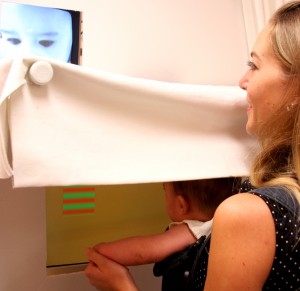Podcast: Play in new window
BOB HIRSHON (host):
Preemie vision. I’m Bob Hirshon and this is Science Update.

At UC San Diego’s Infant Vision Lab, a researcher plays a sound to get the attention of the baby she’s holding.
(SFX: Attention getter sound)
Contrasting green and red bars then appear on a computer screen. The researcher records whether the baby notices the difference between the colors. Developmental psychologist Emily Blumenthal says premature infants tend to discriminate between the two colors better than full-term babies.
EMILY BLUMENTHAL (UC San Diego):
These infants have the same biological age in terms of date from conception as infants who were born full-term, but they have more experience in the outside world, because they were born prematurely.
HIRSHON:
This extra experience may give otherwise healthy preemies an edge when it comes to color vision development. But they do no better than their full-term peers at distinguishing light from dark, suggesting that sensitivity to brightness might be more influenced by genetic factors than color vision is. I’m Bob Hirshon for AAAS, the science society.
